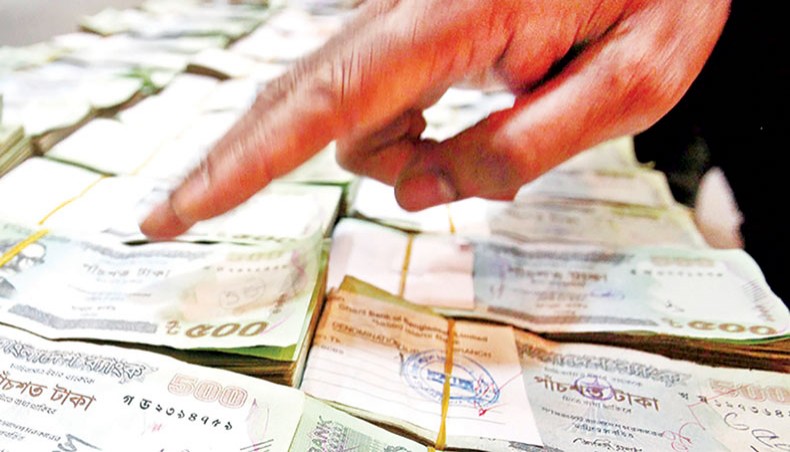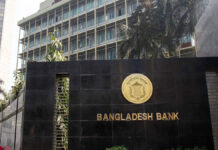New Age
HM Murtuza | Oct 07,2020

A file photo shows a man counting bundles of taka notes in Dhaka. The government’s borrowing from the country’s scheduled banks grew by Tk 26,303.18 crore in July-September of this fiscal year of 2020-21 but it repaid the Bangladesh Bank Tk 23,270.32 crore in the three months.— New Age photo
The government’s borrowing from the country’s scheduled banks grew by Tk 26,303.18 crore in July-September of this fiscal year of 2020-21 but it repaid the Bangladesh Bank Tk 23,270.32 crore in the three months.
So, the net borrowing of the government from the banking system came down to Tk 3,032.86 crore in July-September of FY21 against Tk 26,656.59 crore in the same period in FY20.
The government’s borrowing from the BB dropped to Tk 21,083 crore at the end of September from Tk 44,353.5 crore three months ago but its borrowing from the scheduled banks increased to Tk 1,59,772.7 crore from Tk 1,33,469.51 crore.
Bangladesh Bank officials said that the government’s net borrowing from the banking system dropped due mainly to an increase in sales of national savings certificates and improvement in revenue collection situation.
A BB official said that the government’s payment to the central bank against its debts would lower the money circulation on the market.
Lowering money circulation on the market would help check inflation, he said.
Policy Research Institute executive director Ahsan H Mansur told New Age, ‘In the present context, payment to the BB by the government is good as it reduces the volume of high-powered money from the market as the circulation of high-powered money has an impact on inflation.’
About the government’s borrowing from the scheduled banks, Ahsan, also the BRAC Bank chairman, said that the banks had adequate liquidity as an impact of policy relaxation and reserve increase.
Around Tk 60,000 crore was injected by the central bank into the market against the reserve rise, he said.
Ahsan said that the low government borrowing was surprising in the context of revenue collection.
Lower spending by the government amid flooding in different areas across the country in recent months might be a reason for the lower net bank borrowing, he said.
Besides, the government may have received some foreign finance in the recent months that helped keep its bank borrowing low and to meet expenses by its own fund, Ahsan said.
He, however, predicted that the borrowing in the coming months would increase when the government would have to spend higher.
Another official of the central bank said that the government had around Tk 12,000 crore in surplus money in its accounts even after its payment to the BB.
The official said that the bank depositors, dejected by the low interest rates offered by the banks after the implementation of the 9-per cent ceiling on lending rate, had shifted their funds to the NSCs to avail higher yield against their investments.
In July-August of FY21, the net sales of national savings certificates doubled to Tk 7,455 crore from Tk 3,660 crore in the same period of FY20.
The revenue collection by National Revenue Board fell Tk 10,784 crore short of target in July-August of FY21 as tax officials managed to collect Tk 30,163 crore against the target of Tk 40,947 crore set for the period.
The revenue mobilisation, however, entered into the positive zone with a 0.16-per cent growth in the two months.
In the budget for FY21, the revenue collection target was set at Tk 3,78,000 crore, leaving deficit of Tk 1,90,000 crore.
For deficit financing, the government has planned to collect Tk 1,09,983crore from the domestic sources including Tk 84,980 crore from the banking system.









